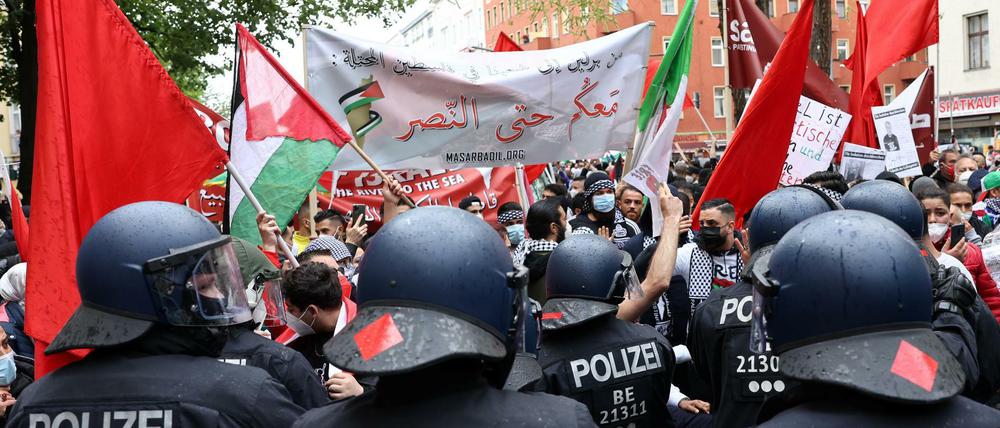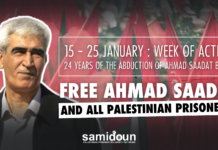
Samidoun Palestinian Prisoner Solidarity Network condemns the recent report published by the conference of German interior ministers which aims to target Palestinian communities and Palestine solidarity activism with repression and criminalization. We urge not only all supporters of Palestine but all defenders of basic democratic rights to act now to prevent the ministers from implementing these plans that aim to repress one of the largest Palestinian communities in Europe.
The conference in question took place between 30 November 2022 and 2 December 2022, involving interior ministers of all 16 German states. Two working groups were assigned by the conference to specifically address “Need for action due to increasing anti-Semitic and anti-Israeli agitation in the context of the Middle East conflict”. Namely the “internal security” and the “Verfassungschutz” working groups (the Office for the Protection of the Constitution, Germany’s internal intelligence agency). In other words, the state is moving towards explicitly and admittedly treating Palestinian and Palestine solidarity organizing as a target for criminalization and repression. In addition to the two working groups, federal criminal police officials and “antisemitism commissioners” took part in formulating the report, which aims at laying out a list of recommendations and courses of action for the interior ministries of the German federations. Ten of Germany’s 16 states were explicitly represented in the working group.
It is important to note that many of these “antisemitism commissioners”, rather than dedicating their attention to confronting fascism and Nazism that is on the rise in Germany and in Europe as a whole, instead spend their time promoting the Israeli occupation and war crimes, and attacking Palestinian organizing in Germany. For example, the antisemitism commissioner of Frankfurt, Uwe Becker frequently demands the cancellation of Palestinian events and does not hesitate to appear for photo ops with Israeli military officials promoting the bombing of Gaza.
Following the banning by Berlin’s interior minister of all events commemorating the Nakba, including events and marches organized by Samidoun and Palestine Speaks, in May 2022, the documents produced by the conference specifically call for the targeting of these two groups, as well as campaigns for boycott, divestment and sanctions against Israel generally. It was this ban on Nakba day that led to the creation of a new coalition to defend democratic rights, especially those of targeted communities and oppressed groups.
In addition, the interior ministers propose a series of criminalizing and politically propagandistic interventions to promote Zionism and suppress Palestinian organizing and narratives, including:
- Requiring school teachers to promote positive images of “Israel” in German classrooms and implementing educational agendas portraying the occupation more positively.
- Further implementation of the IHRA definition of antisemitism: a definition whose sole purpose appears to be the stigmatization and criminalization of Palestinian advocacy. With that, it categorized the reports labelling the occupation as an apartheid regime as “anti-Semitic”.
- Advancing criminal prosecutions for anti-Semitic statements as defined by the IHRA.
- Prohibiting (and subjecting to criminal sanctions) the slogan “From the river to the sea, Palestine will be free” and the map of all of Palestine, as they question the occupation’s “right to exist”.
- Creating “new legal bases” for “prosecuting previously permissible efforts” that challenge the Israeli regime.
- Moving towards banning pro-Palestinian associations and activities under the guise of “combating Israel-related antisemitism”.
- Promoting normalization activities and initiatives.
The report identified 35 state-funded projects to “combat Israel-related antisemitism”, 649 such projects to fight antisemitism overall, based on the IHRA definition; and 138 projects targeting schools, kids and youth. It is important to note that such projects specifically aim to target Palestinian and Arab children growing up in Germany as well as a new generation of German youth who share the perspective of young people around the world in rejecting Zionism and racism.
Let us be clear: there is nothing about this meeting and its proposals that is about fighting antisemitism. If it were, it would instead focus on the extreme right, the growth of which has even led to a recent set of arrests around a neo-Nazi coup plot. Instead, the focus is on the interests of German imperialism, U.S. imperialism and the Zionist project in Palestine, at the expense of Palestinians in Germany and in occupied Palestine. Rather than take responsibility for European fascism, neo-Nazi and extreme right elements and German history, these German politicians instead seek to displace that responsibility onto Palestinians, Arabs and Germans who support the rights of the Palestinian people.
Germany votes “no” at the United Nations on resolutions against the glorification of Nazism, attempting to justify that decision by blaming Russia, despite the reality that Russia — and the entire Soviet Union — bore one of the greatest brunts of the Nazi assault in World War II.
These events are not unrelated. By shifting the definition of antisemitism from one that accurately reflects the ideology that motivated Nazism and fascism to one that instead focuses on the legitimization of the Israeli occupation and the Zionist project (the so-called “IHRA definition”), the German government is doing the opposite of taking responsibility for Nazi crimes. It is, in effect, minimizing those atrocities and their ongoing legacy by instead celebrating the Zionist regime and demonizing the Palestinians who defend their land and resist colonization.
German officials — particularly in Berlin, a city with a very large Palestinian community and an active and mobilized anti-imperialist left — are already pursuing these policies in fact. Multiple Palestinian students have already been threatened with deportation and bans from Germany and Europe for attending or registering a legal demonstration for Palestine with the police. Hundreds of people were arrested or ticketed for commemorating the Nakba in Berlin in May 2022. Palestinian writer Khaled Barakat was subjected to a political ban and expelled from Germany for his political activities, only months after torture survivor and former political prisoner Rasmea Odeh was subjected to a political ban and her Schengen visa revoked.
On multiple occasions, German officials, including interior ministry and immigration department officials in Berlin, have attempted to justify these severe repressive acts — this crisis of democratic expression — by reference to notorious Zionist propaganda arms like NGO Monitor, or by reference to the Israeli regime labeling Samidoun a “terrorist organization”. At the same time, in Ramallah, representatives of Germany’s foreign ministry feign shock at the very same designation applied on an identical basis to Palestinian NGOs in occupied Palestine and note that such allegations are unproven. It is clear that these German officials seem to believe that Palestinians in Germany should have even fewer rights to organize, express themselves, demonstrate and struggle for freedom than those living under military occupation.
In reality, there is a long history in Germany of anti-imperialist organizing and support for Palestine — and for a clear recognition that the two are intimately connected. Of course, recognition of Palestinian rights was the official policy of the German Democratic Republic. In addition, Germans joined people from around the world in travelling to the Palestinian refugee camps in Lebanon to join the Palestinian revolution as volunteers of all kinds, participating in everything from health support to armed struggle. On the popular movement level, campaigns to boycott Israel and support the Palestinian resistance — including, explicitly, the armed struggle — took place throughout Germany as part and parcel of anti-imperialist organizing, repeatedly coming into confrontation with the Federal Republic of Germany’s government. The attempt to “left-wash” the Israeli occupation through a claimed “anti-German” ideology that in fact mirrors German and U.S. foreign policy largely follows German reunification: advancing, rather than confronting, imperialism.
The Palestinian and Arab community has grown significantly in Germany in the past 10 years, although this builds among an already significant community that has experienced multiple waves of repression in the Federal Republic of Germany, from the large-scale deportation of Palestinian students in the 1970s to the explicit restrictions imposed upon Palestinians from Lebanon seeking to immigrate to Germany or seek asylum. In many ways, these proposals, while threatening, are also a recognition of the growing power and stronger alliances of this community, as tens of thousands have repeatedly taken to the streets to march for the liberation of Palestine, from the river to the sea.
From legal battles like those undertaken by the Stuttgart Palestine Committee that secured their right to space and bank account, to Khaled Barakat’s battle that saw his political ban declared illegitimate, to the grassroots organizing that the largely youthful and Palestinian comrades of Samidoun in Germany engage in on the streets on a daily basis, from mass demonstrations to postering and raising the image of the leaders and fighters of the Palestinian resistance, supporters of Palestine and anti-imperialists in Germany have never stopped fighting back and will not be forced into submission by this latest threat.
The International Association of Democratic Lawyers adopted a resolution at its December 2022 meeting, noting that “the IADL condemns these actions to suppress expression on Palestine as a form of German and European complicity with ongoing Israeli colonization, apartheid and occupation in Palestine, including ongoing war crimes and crimes against humanity.”
The struggle for the liberation of Palestine is a struggle confronting imperialism, Zionism and the reactionary agents that do their bidding. Inside occupied Palestine, we see the appointment of overtly fascist figures such as Bezalel Smotrich and Itmar Ben Gvir as yet another attempt to intimidate the Palestinian people, who have shown for 75 years of Nakba, 100 years of colonization and more that they will never be intimidated or defeated. Indeed, the rising power of the Palestinian resistance and liberation struggle — including the increased involvement, visibility and action of the Palestinians in exile and diaspora around the world — is provoking alarm in the centres of imperialism and Zionism. These threats by German officials must be met with more organizing, more action and more resistance and with a clear message from all who value human dignity, democratic rights and a rejection of colonialism: that we will stand together against criminalization and repression, and that together, we will struggle — until, from the river to the sea, Palestine will be free.
Discover more from Samidoun: Palestinian Prisoner Solidarity Network
Subscribe to get the latest posts sent to your email.




